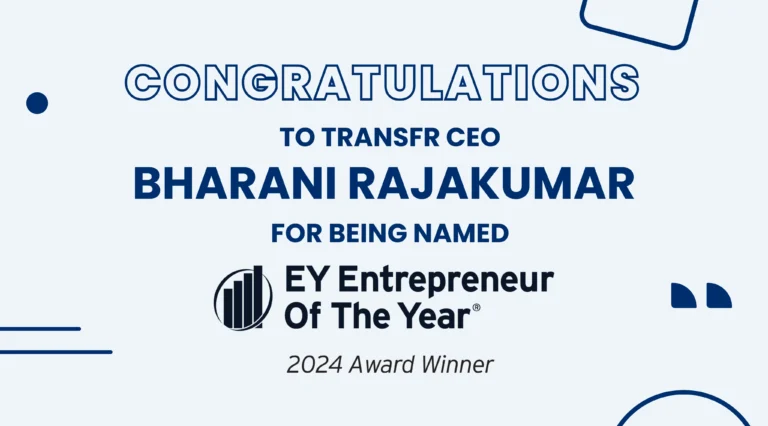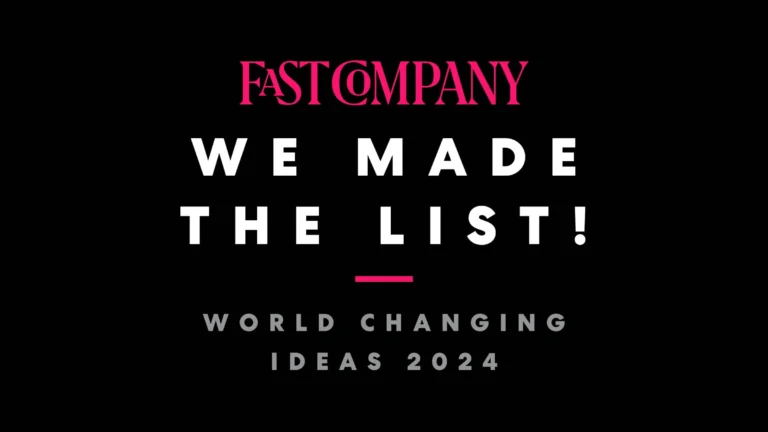Transfr is all about helping people from all walks of life find their own unique pathways to prosperity. What those pathways look for varies wildly from person to person. We know the highschool-to-college route of the last several decades doesn’t work for everyone — we also know that everyone has the potential to do great things, if given the chance.
That commitment starts right here, in-house at Transfr. Our teams are wall to wall with people from unique and interesting backgrounds not often seen in tech. Founder and CEO Bharani Rajakumar even has a nontraditional career path of his own.
We sat down with Bharani on Upward, the Transfr podcast, to talk about the unique path he took to becoming Transfr CEO, as well as his vision of offering diverse pathways for career success and upward mobility to everyone.
Defining a nontraditional career pathway
Bahrani’s path to business leader wasn’t linear:
“My first job was at Wendy’s,” he said with a laugh during the interview. “I grew up in Gainesville, Florida then moved to New York City.”
As the son of hardworking immigrants, he recalls that while growing up he’d never thought of being a founder or CEO or going into the business world. Working (including his first fast food job) was considered a positive contribution to family well-being. His relatives’ definition of success, however, was based around joining certain high-profile professions:
“Science was [the] focus. In traditional Indian families, you become a doctor, lawyer, or engineer. None of those really pumped me up.”
After studying hard and working in finance, the idea for Transfr began to take shape: There must be better paths for those entering the workforce to find well-paid work that suits them.
“I bet you there’s a lot of people out there like me.” Bharani said, regarding his circuitous career path. “Transfr’s goal is to help people struggling to find a career. We want to help them seize the right opportunity and click with an employer so that they can positively contribute to their communities and families.”
In a material society, doing well is part of the equation.
“The genesis of Transfr is ‘How do we build a system [for] everyone to get on a career path to upward mobility’?” says Bharani.
It was the pursuit of that vision that ultimately put Bharani in the driver’s seat at Transfr: “I kind of became de facto CEO and founder… nobody else wanted to leave their job to do it.”
Pathways beyond four-year colleges
“People focus on getting into ‘the right school’ — as early as elementary school!” Bharani observed. “It can be really stressful! [Nontraditional pathways are an] equalizer. The reality is, not everyone can attend a Top-20 school.”
This focus on “the right schools” and other highly competitive and exclusionary educational pathways leaves a lot of people feeling like their chances for a good life are nonexistent. On the other side of the coin, companies talk a lot about a “worker shortage,” completely missing that what’s actually going on is a mismatch when it comes to directing workers to fields where jobs need doing.
“We focus on people we refer to as ‘undiscovered talent,’” Bharani explained. “These folks have a lot to offer, but companies haven’t met them yet.”
In short, a determined person can leverage career training and transferable experience to be as viable (or more!) than a graduate from a four-year college or university program.
How and why employers benefit from nontraditional candidates
Bharani also opined on the macroeconomic forces potentially driving a sea change in hiring:
“Number 1 is Baby Boomers retiring to the tune of about 11,000 people per day. Companies are feeling the crunch. Number 2, there are a lot of folks out there questioning whether the traditional higher ed model is for them.”
To efficiently pair quality jobs with excellent undiscovered candidates, Bharani says that companies must “come to the conclusion that great talent can come from a lot of different places. It doesn’t have to come from a specific pedigree, program or geography.”
Nontraditional candidates are an underused asset for companies and organizations, representing unexplored paths in the existing job market. Today’s workers aren’t interested in “any job,” but in opportunities for upward mobility and advancement. However, they might not know where to focus.
How AR and VR career exploration can help with career exploration and pathing
Transfr’s goals include leveraging AR and VR technologies to help students and transitioning workers explore careers in well paying, in-demand jobs that best suit their strengths.
“We help workforce development agencies, employers and education — high schools and two-year colleges — in ‘career exploration,’ where someone can put on a headset,” Bharani said, “and advise, develop, co-create curriculums to get people on a pathway. The last thing we want is for people to graduate and just be lost… that’s the premise of our business model.”
Insights into training and overall career path options empower candidates to direct themselves towards a better tomorrow. VR and AR experiences are a powerful way to give learners a fuller sense of which jobs are a right fit for them and how to prepare for and secure them.
“What we’re excited about is creating classroom-to-career pathways,” Bharani enthused. “We want to help folks get the skills that they need: Hands-on training and exposure.”
He’s optimistic about the capabilities of VR allowing learners to try out what a variety of occupations might be like, and then enroll in a program that they feel makes the most sense for them, ultimately leading to job placement.
With insights in-hand, the playing field is more level for everyone to find a place that’s the right fit. Bharani believes it’s the foundation elevating workers to ask more self-actualizing, and ultimately more satisfying, questions about directing their career: “How would you like to contribute? What interests you? What excites you? What motivates you in the morning?”
About Bharani
Bharani Rajakumar, Transfr founder and CEO, was also the co-founder of math tutoring software vendor LearnBop. In 2016, Bharani received the “Outstanding Leader of the Year” award from the US Distance Learning Association. He founded Transfr in 2017 using his understanding of how people learn, what gets them excited, and what skills they need to master in order to create their own pathways to career success.





